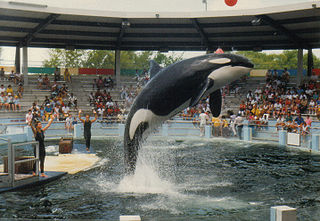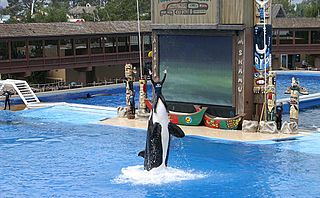
The Babylonian captivity or Babylonian exile is the period in Jewish history during which a number of people from the ancient Kingdom of Judah were captives in Babylon, the capital of the Neo-Babylonian Empire.
Ex situ conservation literally means, "off-site conservation". It is the process of protecting an endangered species, variety or breed, of plant or animal outside its natural habitat; for example, by removing part of the population from a threatened habitat and placing it in a new location, which may be a wild area or within the care of humans. The degree to which humans control or modify the natural dynamics of the managed population varies widely, and this may include alteration of living environments, reproductive patterns, access to resources, and protection from predation and mortality. Ex situ management can occur within or outside a species' natural geographic range. Individuals maintained ex situ exist outside an ecological niche. This means that they are not under the same selection pressures as wild populations, and they may undergo artificial selection if maintained ex situ for multiple generations.

Jeconiah, also known as Coniah and as Jehoiachin, was the nineteenth and penultimate king of Judah who was dethroned by the King of Babylon, Nebuchadnezzar II in the 6th century BCE and was taken into captivity. He was the son and successor of King Jehoiakim, and the grandson of King Josiah. Most of what is known about Jeconiah is found in the Hebrew Bible. Records of Jeconiah's existence have been found in Iraq, such as the Jehoiachin's Rations Tablets. These tablets were excavated near the Ishtar Gate in Babylon and have been dated to c. 592 BCE. Written in cuneiform, they mention Jeconiah and his five sons as recipients of food rations in Babylon.

Prelude on the Babylonian Captivity of the Church was the second of the three major treatises published by Martin Luther in 1520, coming after the Address to the Christian Nobility of the German Nation and before On the Freedom of a Christian. It was a theological treatise, and as such was published in Latin as well as German, the language in which the treatises were written.

A dolphinarium is an aquarium for dolphins. The dolphins are usually kept in a large pool, though occasionally they may be kept in pens in the open sea, either for research or for public performances. Some dolphinariums consist of one pool where dolphins perform for the public, others are part of larger parks, such as marine mammal parks, zoos or theme parks, with other animals and attractions as well.

Lolita is a 20-foot-long (6 m), 7,000 pounds (3,200 kg) orca who has lived at the Miami Seaquarium since 1970.

Captive breeding, also known as "captive propagation", is the process of maintaining plants or animals in controlled environments, such as wildlife reserves, zoos, botanic gardens, and other conservation facilities. It is sometimes employed to help species that are being threatened by human activities such as habitat loss, fragmentation, over hunting or fishing, pollution, predation, disease, and parasitism. In some cases a captive breeding program can save a species from extinction, but for success, breeders must consider many factors—including genetic, ecological, behavioral, and ethical issues. Most successful attempts involve the cooperation and coordination of many institutions.

Captivity narratives are usually stories of people captured by enemies whom they consider uncivilized, or whose beliefs and customs they oppose. The best-known captivity narratives in North America are those concerning Europeans and Americans taken as captives and held by the indigenous peoples of North America. These narratives have had an enduring place in literature, history, ethnography, and the study of Native peoples.
The Captive may refer to:

Animals that are held by humans and prevented from escaping are said to be in captivity. The term is usually applied to wild animals that are held in confinement, but may also be used generally to describe the keeping of domesticated animals such as livestock or pets. This may include, for example, animals in farms, private homes, zoos and laboratories. Animal captivity may be categorized according to the particular motives, objectives and conditions of the confinement.

A marine mammal park is a commercial theme park or aquarium where marine mammals such as dolphins, beluga whales and sea lions are kept within water tanks and displayed to the public in special shows. A marine mammal park is more elaborate than a dolphinarium, because it also features other marine mammals and offers additional entertainment attractions. It is thus seen as a combination of a public aquarium and an amusement park. Marine mammal parks are different from marine parks, which include natural reserves and marine wildlife sanctuaries such as coral reefs, particularly in Australia.
The Babylonian captivity was the period in Jewish history during which the Jews of the ancient Kingdom of Judah were captives in Babylon.
Redemption is an essential concept in many religions, including Judaism, Christianity and Islam. The English word "redemption" means 'repurchase' or 'buy back'.
Captive or Captives may refer to:

Abnormal behavior of birds in captivity has been found to occur among both domesticated and wild birds. Abnormal behavior can be defined in several ways. Statistically, 'abnormal' is when the occurrence, frequency or intensity of a behaviour varies statistically significantly, either more or less, from the normal value. This means that theoretically, almost any behaviour could become 'abnormal' in an individual. Less formally, 'abnormal' includes any activity judged to be outside the normal behaviour pattern for captive birds of that particular class or age. For example, running rather than flying may be a normal behaviour and regularly observed in one species, however, in another species it might be normal but becomes 'abnormal' if it reaches a high frequency, or in another species it is rarely observed and any incidence is considered 'abnormal'. This article does not include 'one-off' behaviours performed by individual birds that might be considered abnormal for that individual, unless these are performed repeatedly by other individuals in the species and are recognised as part of the ethogram of that species.

Captivity, or being held captive, is a state wherein humans or other animals are confined to a particular space and prevented from leaving or moving freely. An example in humans is imprisonment. Prisoners of war are usually held in captivity by a government hostile to their own. Animals are held in captivity in zoos, and often as pets and as livestock.

The Orca Welfare and Safety Act is a bill passed in the U.S. state of California in 2016. The bill phases out the holding of killer whales in captivity and establishes standards for treatment of all remaining captive orcas in zoos.
Rav Mari bar Rachel bat Shmuel, also known as Mari Breh deBat Shmuel was a Babylonian rabbi from the third and fourth generations of amoraim.











